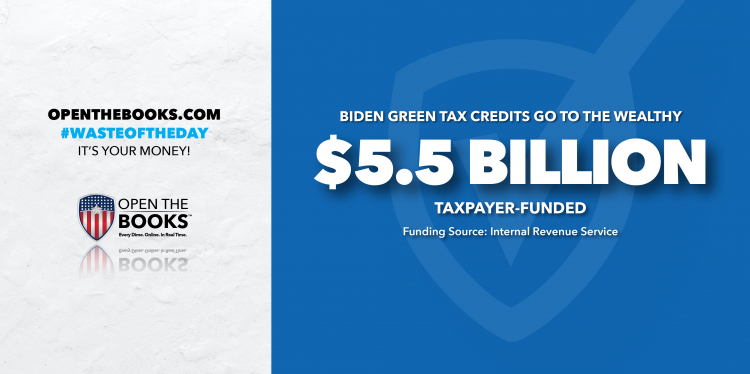Executive
Waste of the Day: The Rich Get Richer Under Biden’s Tax Credits
Joe Biden promoted solar panel tax credits that help those who can afford a solar installation and do not benefit anyone else.

Topline: President Joe Biden’s Inflation Reduction Act expanded a tax credit program meant to incentivize homeowners to buy solar panels and other green technologies, but most of the tax breaks are going to families that can already afford the renovations.
The Biden solar tax credit helps wealthy families who can afford to install the panels
The top 25 percent richest households in the U.S. got two-thirds of the tax credits, amounting to $5.5 billion. The bottom 25 percent got only $32 million, according to Politico’s E&E News.
Key facts: Economists told E&E News that solar panels help wealthy families save money on their electric bills, and they would likely purchase them even without the tax credits.
The credits reduced federal income tax revenue by $8.4 billion last year — $6 billion more than the Congressional Budget Office projected. $2 billion of the credits went to households with incomes above $200,000, E&E News found.
Biden has extended the program through 2031, which the CBO predicts will cost $34 billion — even as it cost $42 billion in the 16-year period from 2006 to 2021.

Another Inflation Reduction Act program targeted more specifically toward low-income families has not found any traction. It’s supposed to give rebates for buying energy-efficient equipment, but only New York and Wisconsin have started offering the rebates. Twenty-seven states haven’t even applied for funding, E&E News reported.
Search all federal, state and local government salaries and vendor spending with the AI search bot, Benjamin, at OpenTheBooks.com.
Critical quote: “It’s a lot of money for relatively low emissions reductions,” Brookings Institution economist Sanjay Patnaik told E&E News. “It runs the risk of making climate policy less accepted by the public because people will say, ‘This is running up a big bill and is costing much more than expected.’”
A Berkeley professor wants a carbon tax
University of California, Berkeley, energy economist Lucas Davis took a differing stance, arguing that the federal government should take an even stronger approach by directly taxing carbon emissions.
“I understand the political advantage of subsidies, but in terms of changing behavior and economic efficiency, the tax approach has many advantages,” Davis told E&E News. “When you tax carbon emissions directly, people look for all kinds of ways to reduce carbon emissions … Maybe I buy a bike or move closer to work or don’t take as many airline flights.”
Summary: While Climate change is one of the greatest fiscal challenges facing the government, that doesn’t give it permission to spend taxpayer money on inefficient solutions.
The #WasteOfTheDay is brought to you by the forensic auditors at OpenTheBooks.com
This article was originally published by RealClearInvestigations and made available via RealClearWire.
Jeremy Portnoy, former reporting intern at Open the Books, is now a full-fledged investigative journalist at that organization. With the death of founder Adam Andrzejewki, he has taken over the Waste of the Day column.
-

 Accountability4 days ago
Accountability4 days agoWaste of the Day: Principal Bought Lobster with School Funds
-

 Civilization1 day ago
Civilization1 day agoWhy Europe Shouldn’t Be Upset at Trump’s Venezuelan Actions
-

 Executive2 days ago
Executive2 days agoHow Relaxed COVID-Era Rules Fueled Minnesota’s Biggest Scam
-

 Constitution3 days ago
Constitution3 days agoTrump, Canada, and the Constitutional Problem Beneath the Bridge
-

 Christianity Today1 day ago
Christianity Today1 day agoSurprising Revival: Gen Z Men & Highly Educated Lead Return to Religion
-

 Civilization2 days ago
Civilization2 days agoThe End of Purple States and Competitive Districts
-

 Executive2 days ago
Executive2 days agoWaste of the Day: Can You Hear Me Now?
-

 Civilization5 days ago
Civilization5 days agoThe Conundrum of President Donald J. Trump






